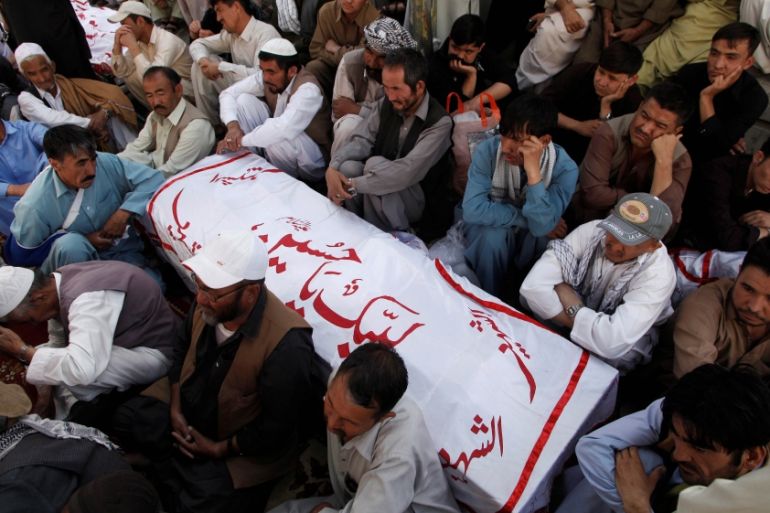Hazara Shia Muslims attacked in Pakistan’s Quetta
At least five killed, including three members of Shia community, in drive-by shooting in Balochistan province.

Islamabad, Pakistan – Unidentified men have killed five people in an attack on the minority Hazara Shia Muslim community in the southwestern Pakistani city of Quetta, police say.
Two attackers riding a motorcycle opened fire on a van bound for a nearby vegetable market, killing the driver and four others early on Monday morning, Quetta police chief Abdul Razzaq Cheema told reporters.
Keep reading
list of 4 itemsPalestinian Prisoner’s Day: How many are still in Israeli detention?
‘Mama we’re dying’: Only able to hear her kids in Gaza in their final days
Europe pledges to boost aid to Sudan on unwelcome war anniversary
The incident is the latest in a campaign that has targeted Hazara Shia in the southwestern city for more than half a decade.
The series of bombings, suicide attacks and targeted assassinations has seen the community forced to live in two heavily protected enclaves on either side of the city.
“When [Hazaras] go to get vegetables [from the city’s main market], we have put a system in place to provide them protection on the way there,” said police official Cheema. “We have requested them to […] use that convoy only, and to return in that convoy as well.”
The men who were killed on Monday were travelling separately from the convoy, Cheema said.
Hazara community leaders, however, disputed the claim that they were regularly provided protection for trips to the vegetable market.
“It is not a regular system,” Qayyum Changezi, the chief of the Hazara Qaumi Jirga group, told Al Jazeera. “We need vegetables every day, and the police do not provide us armed guards every day.
“And of course, even if there are no security arrangements, vegetable sellers still have to go to the main market.”
The dead included three ethnic Hazaras as well as two others. One Hazara Shia suffered serious bullet injury to his neck.
“He is now out of danger,” Dr Farid Sumalani, a senior hospital official at Quetta’s main Civil Hospital, where the man was being treated, confirmed.
Sumalani and Cheema both confirmed the death toll from the attack.
‘We are in a sort of jail’
Since 2002, at least 2,679 Shia Muslims, who make up about 15 percent of the 207 million population of Pakistan, have been killed in a sustained campaign of targeted attacks and bombings, according to the independent South Asia Terrorism Portal (SATP).
While the frequency of attacks has reduced in recent years, the community remains in the crosshairs of many armed groups, including the Tehreek-e-Taliban Pakistan (TTP), Lashkar-e-Jhangvi and, most recently, the so-called Islamic State of Iraq and the Levant (ISIL, also known as ISIS) group.
No group immediately claimed responsibility for the attack on Monday.
Attacks against the ethnic Hazara community, who are mainly resident in Quetta, the capital of Balochistan province, have ramped up in recent years, with hundreds killed since 2012.
In one of the largest such attacks, 96 people were killed when bombers attacked a snooker club frequented by young Hazara men in January 2013. A month later, 84 people were killed in an attack on a crowded vegetable market mostly used by ethnic Hazaras.
The community has also been frequently targeted in hit-and-run attacks by assailants on motorcycles, as well as attacks on buses carrying members of the community travelling to neighbouring Iran for religious pilgrimages.
So far this year, at least 14 Hazaras have been killed in such targeted attacks, according to the SATP.
“I am not satisfied with the security arrangements at all,” said Changezi. “The arrangements seem to be completely fool-proof in appearance, but it seems very easy for terrorists to carry out such attacks, too.”
While arrangements within the two ethnic Hazara enclaves were adequate, Changezi said, the system meant that Hazaras continue to feel insecure when visiting any other part of the city to work, attend educational institutes or for personal visits.
“We are in a sort of jail. We have paramilitary personnel around us, but we cannot travel outside [the enclaves] freely,” he told Al Jazeera, speaking from the Alamdar Road enclave.
Asad Hashim is Al Jazeera’s Web Correspondent in Pakistan. He tweets @AsadHashim